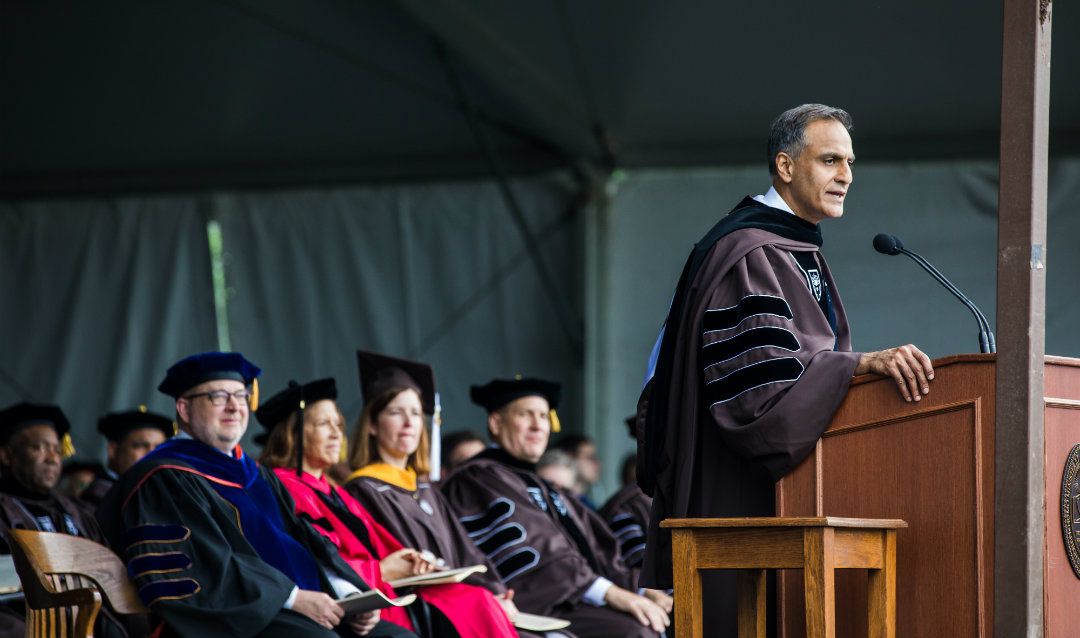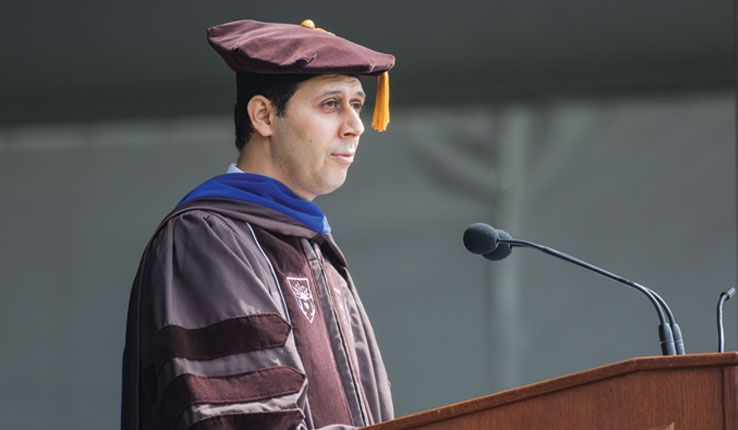In a stirring speech delivered to members of the Class of 2019 and their families in Goodman Stadium, former U.S. Ambassador to India Richard Verma ’90 urged the young graduates to maximize the unprecedented opportunities they have been given to face a problem-plagued world with “the humility and responsibility that comes with power.”
The young graduates entered Lehigh “as perhaps one of the smartest classes we’ve ever had, shattering all records in your SAT scores, GPA and class ranking,” said Verma, a leading expert on trade and diplomacy and now a vice chair and partner with The Asia Group. “It’s a pretty safe bet to assume I would never have been admitted here…And you enter the work world with an unlimited set of options, with what feels like new innovations and inventions at every turn.”
But, he added, “we have also left you with a range of real challenges. The U.S. is no longer a dominant and unchallenged world power. We face new and real competition from rising powers. We have either been unable or unwilling to stop the planet from warming. And we’ve seen a rise in authoritarian, nationalist and populist regimes across the globe, and we are facing real and polarizing division right here at home.”
Verma harkened back to his early days at Lehigh, when “just a kid from Johnstown, Pa.” arrived as a freshman in 1986, moved into M & M, was part of the Air Force ROTC, played ice hockey, pledged a fraternity, studied abroad, majored in industrial engineering and ended up double-minoring in international relations and beer pong. “That beer pong minor has not benefitted me as much as I’d hoped,” he noted.
But Verma’s adjustment to Lehigh paled in comparison to that of his father’s, who came to the United States from India in 1963 “with only a few dollars and a bus ticket.” His story, Verma said, “was a very American story, an immigrant story.” His parents eventually became U.S. citizens, and worked hard to maintain their Indian roots and cultural traditions. “Don’t ever forget that diversity is our strength,” he said. “It gives us unique advantages in the world.”
Verma said when he traveled the world as a diplomat, he was always heartened by the number of soldiers, sailors, airmen and Marine and Foreign Service officers who were not born in the U.S. and who didn’t even speak English as their first language. “Yet,” he said, “they decided to devote their life to serving the country that welcomed them. This is a vision of America that must endure. It’s a vision that allows me – an immigrant, a naturalized citizen and a veteran – to stand before you today.”
Monday’s commencement address was not Verma’s first. Twenty nine years ago, Verma spoke as president of his senior class, when the global mood and hierarchy was far different. The U.S., he said, “stood at the top of the world’s pecking order – unchallenged, unmatched and uncontested.” Changes around the world, as well as on the Lehigh campus, continued to come at a dizzying pace in the nearly three decades that passed since that day, and Verma said he wanted to share his lessons learned from a journey that included working in dozens of nations.
First, Verma said he wanted to acknowledge the special and unique role the Americans play in the world. “I’ve seen your government do heroic things overseas – provide critical aid after disasters, defend democracies under siege, help rebuild war-torn societies. At our Embassy and consulates in India, I saw every agency of our U.S. government hard at work, often in difficult conditions, promoting U.S. interests and building deeper ties with key partners in health, clean energy, defense, trade and so much more.”
And government workers are not alone, he said. “Ordinary Americans – teachers, retirees, health professionals and students like you are working in schools, in medical clinics and development projects – and they are having a big impact.”
Drawing on the heroic sacrifice made by 18- to 28-year-old “soldiers of democracy” in the infamous D-Day battle of Normandy, he asked graduates not to forget about the good we have done and continue to do in different corners of the planet. “You will have the opportunity to chart America’s course in this century,” he said. “I hope you will draw upon the best of our traditions, the big hearts of our people, with the humility and responsibility that comes with power.”
Secondly, we are much better working together with friends and allies than working alone. Today’s challenges, Verma said, are far too complex to be solved by any one country, and solutions can only be forged by treating friends and partners with respect.
“This will require empathy and understanding and perhaps reminding ourselves that history did not start yesterday, and that map we studied growing up in grade school with the U.S. at the center and all the other countries on the edges is not actually how the world works,” he said. “We can’t cut ourselves off from the rest of the world. Isolation and retrenchment are not options.”
And as the graduates set out to do more globally, they cannot ignore how internal divisions are hampering U.S. efforts overseas. “Our country seems more and more polarized,” he said. “We are divided by seemingly everything these days: political camps, social and economic groupings, geography, even by those who went to college and those who haven’t. And it seems like the rift is only getting wider, with political leaders seeking to incite and exploit our divisions, blaming others and degrading national discourse.”
Members of the Class of 2019 have the world at their fingertips, and carry the potential to stamp out diseases like TB and malaria, put an astronaut on Mars, create an energy surplus for the first time in history, and work toward a more just and inclusive society.
“Don’t get sidetracked,” he said. “Reject the noise. Stand up for what you believe in, and do so with the humanity, heart, grace and respect for others both here at home and abroad.”
Finally, Verma urged graduates to consider more than professional advancement, fame, notoriety or material acquisition when taking measure of success in life. “What I’ve learned is that the most meaningful barometer of success will be whether you were there for others when they needed a hand. Did you speak up for those whose voices not being heard? Did you stand up against unfairness and injustice or the way someone was being treated? What did you do to contribute to your community, your school, your church or family, to the environment or to a worthy cause?”
This advice doesn’t apply only to those who seek public service, Verma said. “The great Eleanor Roosevelt used to say that the real battle for social justice and equality are ‘in the small spaces, close to home – so close and so small that they cannot be seen on any maps or the world.’
“So when the joy and celebration of this passes, when the clicks, likes, friends and posts from our social media feeds are quiet, when this stadium stands empty, when you are alone, asking yourself years from now: Did I make a difference? Am I living a good life? Have I served others? Was I there when my family, my friends or my community needed me? I know that answer will be yes. That’s what Lehigh prepared you to do.”
No Shortcut to Success
The ceremony for Lehigh’s 151st commencement was officially opened by Kevin L. Clayton ’84 ’13P, chairman of the Board of Trustees, who turned the stage over to Lehigh President John D. Simon to welcome the graduating students and their guests, along with the trustees and members of the Class of 1969, who will be celebrating their 50th anniversary next month.
Simon introduced Mohammad Shahabsafa ’19G, the first of three student speakers, who said he was reminded of his first presentation as an undergraduate. “I was so nervous, my legs were shaking,” he said. “Now I’m here, 10 years later, speaking in front of thousands of my Lehigh family. By the way, my legs are not shaking today.”
Shahabsafa shared his personal story of coming to the United States from Iran six years ago, arriving at JFK Airport with his wife and four suitcases – their only possessions in the world. “It was a hard decision to give up all that we had with the hope of building a better future,” he said. “I knew it was going to be tough, but I didn’t know how tough.”
He described his first year at Lehigh as the hardest of his life, as he found himself overwhelmed by a new language, culture and environment. “I asked myself, ‘What the hell have I done?’ However, too much was at stake, and we had to continue on,” he recalled.
When his original research plan didn’t work out, he initially feared failure. “But after a while,” he said, “I started looking at it differently. I learned that research is not always predictable and that challenges open up new opportunities. I began researching what ultimately formed my dissertation. It has brought me accomplishments that I never even dreamed of when starting my Ph.D.”
His most important lesson came through his advisor, Professor Tamas Terlaky, who once told him that progress is not obtained by a “one-night idea,” but rather through constant hard work. “There is no shortcut,” Shahabsafa said. “Hard work is the key to making progress and being successful.”
As he concludes what he describes as an incredible journey and prepares to receive his doctorate in industrial engineering, Shahabsafa also credited Lehigh’s invaluable resources and entrepreneurial spirit with helping him co-found a startup company, which he’s certain will lead to even greater opportunity.
In closing, he shared a poem from Saadi, from 700 years ago:
Going down the path of desert is better than sitting idly
For if I cannot accomplish my ultimate goal, I will try as hard as I can
- Linda Harbrecht
This story originally appeared on Lehigh News. Read the full story here.


